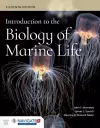
Introduction To The Biology Of Marine Life
3 authors - Hardback
£60.99
John F. Morrissey earned his B.A. and M.A. degrees in Biology from Hofstra University. After teaching marine biology and coral reef ecology in Jamaica for 1 year, he then earned his Ph.D. in Marine Biology and Fisheries from the University of Miami’s Rosenstiel School of Marine and Atmospheric Science. His dissertation research concerned the movement patterns, diel activity, and habitat selection of lemon sharks in Bimini, Bahamas. Since then, Dr. Morrissey has studied the biology of sharks, skates, and rays all over the world, including Jamaica, Japan, the Azores, and the Canaries. He has been on the board of directors of the American Elasmobranch Society since 1996. For 16 years he taught marine biology, a field course in tropical marine biology, and comparative anatomy at Hofstra University, where he won the Distinguished Teacher of the Year Award in 2006. In 2007, Dr. Morrissey moved to Sweet Briar College in central Virginia, along with his egg-laying colony of 100+ chain catsharks, to teach marine biology, comparative vertebrate anatomy, and animal physiology. He won their Excellence in Teaching Award in 2010. He lives on a dirt road in the woods with his wife (who is also his research partner) and their four spoiled cats. James L. Sumich received his M.S. in Biological Oceanography at Oregon State University, joined the biology faculty at Grossmont College, and then returned to Oregon State for a Ph.D. For his Ph.D. thesis, he studied the interactions between newborn gray whale calves and their mothers and the way each budgets its energy expenditures during the period of calf nursing. He has taught marine mammal biology classes for graduates and undergraduates at San Diego State University, University of San Diego, and Oregon State University, where he continues to teach, as the requirements of retirement permit. His retirement activities include continued research and writing on gray whale behavior and energetics. He recently marked the publication of the second edition revision of a textbook on the evolutionary biology of marine mammals, coauthored with Dr. Annalisa Berta and Dr. Kit Kovacs. He lives in a home he has built with his wife, Caren, in the woods near Corvallis, Oregon. Deanna R. Pinkard-Meier earned her B.S. degree in Aquatic Biology from the University of California Santa Barbara and her M.S. degree in Marine Biology from the Florida Institute of Technology. Her early research efforts were concentrated on marine invertebrates near the California Channel Islands. She then moved her research focus and home to the tropics, studying the behavior, reproduction, and recruitment of tropical marine fishes, specifically snappers, damselfishes, and wrasses. After 5 very productive years in the warm waters of the Caribbean and Florida, she ventured back home to California where she worked as a research fisheries biologist for the National Oceanic and Atmospheric Administration (NOAA), studying the endangered white abalone and declining rockfish populations with a remotely operated vehicle. For the past decade Deanna has taught many biology courses at a variety of universities and community colleges in San Diego, while still publishing research with hardworking former colleagues at NOAA. She especially enjoys teaching marine biology, organismal biology, and evolution and introducing students to field survey techniques used in the intertidal or from a boat. She resides in Cardiff-by-the-Sea, California, with her husband and two sons, where they can often be found jumping in the ocean for a surf session or snorkel. She is active in her local community where she participates in Surfrider Foundation events and volunteers as a visiting scientist at local schools.